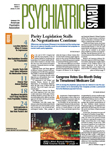Some time ago, an ad appeared on television in which a woman exclaimed “Gotta go!” and rushed from her meeting. Although the purpose of the ad was to sell medication for urinary urgency, the ad suggested a link between urinary urgency and panicking.
That link has now been confirmed in a scientific study. Persons with panic disorder were eight times more likely than controls to experience interstitial cystitis—bladder pain and urinary urgency not caused by a urinary-tract infection.
The study, which was headed by Ardesheer Talati, Ph.D., of Columbia University and is in press with Biological Psychiatry, included 693 subjects: 219 had a diagnosis of panic disorder and a history of anxiety in at least one first-degree relative, 199 had a diagnosis of social anxiety disorder and a history of anxiety in at least one first-degree relative, 173 had both a diagnosis of panic disorder and social anxiety and a history of anxiety in at least one first-degree relative, and 102 controls had no psychiatric disorders over their lifetime and no history of anxiety in first- or second-degree relatives. The diagnostic assessments were made with the Schedule for Affective Disorders and Schizophrenia-Lifetime Version, modified for the study of anxiety disorders and updated for DSM-IV.
A medical history was also obtained during the course of interviews with the subjects, who were asked whether they had ever experienced any of 64 conditions, and if so, the age of onset. The conditions were grouped in the following categories: cancer, cardiovascular, dermatologic, endocrine/glandular, gastrointestinal, genitourinary, hematological, infectious, metabolic, musculoskeletal, neurological/neuromuscular, respiratory, systemic, and a free-response “other” category.
The researchers then looked to see whether subjects with panic disorder and/or social anxiety disorder were more prone to having certain medical conditions than the control subjects. The researchers found that after controlling for age and gender, subjects with panic disorder were eight times more likely than controls to have had interstitial cystitis, and those with social anxiety disorder were five times more likely than controls to have had it. Also after controlling for age and gender, researchers found that panic subjects and social anxiety subjects were at least twice as likely as controls to have had mitral valve prolapse, migraines, irritable bowel syndrome, hypercholesterolemia, hypoglycemia, bronchitis, and skin disorders.
So why the link between panic disorder or social anxiety disorder and these specific medical conditions? Previous studies have found that panic disorder and social anxiety disorder often run in families. Thus, the researchers proposed, panic disorder and social anxiety disorder might share a common genetic basis, but then serve as independent risk factors for the development of specific medical conditions—say, by activating the autonomic nervous system.
Another possibility, Talati and her colleagues pointed out, is that some of the genes that underpin panic disorder and social anxiety may also contribute to the medical conditions with which they've been associated. In fact, other research that they have conducted suggests that the genes may lie on a specific region of chromosome 13.
True, none of the genes known to reside in this region has yet been associated with panic disorder or social anxiety disorder per se. However, the region does contain a gene that makes the serotonin 2A receptor, which has been linked with stress-provoked depression as well as the gene that encodes the endothelin B receptor, which is related to vasoconstriction and could help trigger some medical conditions linked with panic disorder and social anxiety disorder.
The researchers will now investigate whether specific genes on chromosome 13 might explain the link between panic disorder—or social anxiety disorder—and the various medical conditions in question, senior study investigator Myrna Weissman, M.D., a professor of epidemiology in psychiatry at Columbia University, told Psychiatric News.
Meanwhile, the results have some clinical implications, she pointed out.“ Someone ought to see whether the medications used to treat panic disorder can help reduce the symptoms of interstitial cystitis. Also, clinicians treating any one of these disorders might look for the presence of the others.”
An abstract of “Panic Disorder, Social Anxiety Disorder, and a Possible Medical Syndrome Previously Linked to Chromosome 13” can be accessed at<www.journals.elsevierhealth.com/periodicals/bps> under “Articles in Press.” ▪
